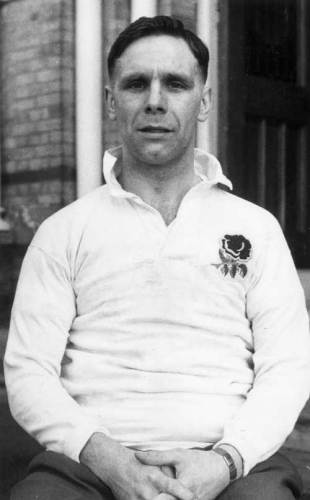|
England v Australia
Old rivalry has rich history
Huw Richards
November 14, 2008

Former England winger Peter Jackson pictured in 1955
© Getty Images
Enlarge
Twickenham has no visitor more familiar or frequent nowadays than the Wallabies. Their match with England this month is their eighth visit since 1997, compared for example to Scotland's six. There was a time, though, when they were seen much less frequently on English grounds. When they ran out at Twickenham a little over 50 years ago, on February 1, 1958, it was regarded as only the third England v Australia match in half a century - following on from the Olympic-winning pioneers of 1909 and the 1947-8 team who were the first Test-playing tourists after the Second World War. Since then the match played by the 1928 New South Wales Waratahs has been reclassified as an Australia Test, on the grounds that there was no rugby union in any other Australian state at the time. Posterity, though, can do nothing for the 1939 team who arrived just in time for the declaration of war. Scarcity helps make such matches more memorable, but the 1958 match would have been remembered at any time. Even if the upgrading of the 1928 contest means England's 9-6 win is no longer regarded as their first against Australia, it was still their first postwar victory over a touring team. It was also a famously brutal contest. Crowds in the 1950s may have been decorous by modern standards, but Twickenham was roused to fury that day by a succession of English injuries put down to dangerous tackling by the Australians. They were reduced to 14 men for the last 50 minutes by an injury to outside-half Phil Horrocks-Taylor, centre Jeff Butterfield was knocked out four times - on one occasion jumping from a stretcher to return to the field. Debutant full-back Jim Hetherington was concussed when he kicked the penalty that levelled the scores at 6-6 late in the second-half. Most memorable of all was the manner of England's victory, secured by an injury time try by one of her greatest ever wingers, Peter Jackson. A brilliant runner who sometimes bemused his team-mates as much as opponents with his unorthodox moves, Jackson had scored three tries in England's Grand Slam campaign the previous year. A month after the Australia match he scored in Paris with a weaving 75 yard during which he stopped dead as a would-be tackler hurtled futilely past. A year later he went with the Lions to New Zealand and lost nothing by comparison with legendary Irish wing Tony O'Reilly. This, though, was his finest single moment as he received a pass on the Australian 25. Butterfield remembered :"He jinked. He swerved. He gained half a yard. He changed pace. He went this way and that, and there were green shirts flailing all over the place." He just made it to the corner as Australian full-back Rod Phelps, beaten earlier in the run, came back for a second shot. Nowadays it would certainly have gone to the video referee. Then it was up to touch judge and referee, who ruled that he had scored.
Jackson was 27, a classic product of Coventry in its greatest era who had gone through the standard local progression of school, old boys club, city club. If he looked comparatively fragile there was good reason - he had survived both a serious kidney complaint as a child and a fractured skull while playing rugby for Old Edwardians - but as well as being a brilliant attacker he was a solid defender, who conceded only two tries to opposite numbers in 20 games for England. He was also pretty durable. Dropped in 1960 because England's selectors felt he lacked the pace to play in a lethally quick threequarter line, he returned three years later in 1963 and played a vital linking role in a brilliant long-range try on an icefield at Cardiff. A county champion several times with Warwickshire, England player, Lion, Coventry secretary and president, Jackson achieved pretty much every honour open to him - except one. He never played for the Barbarians. Jackson, who died aged 73 in 2004, told his rugby-writing namesake that he had been picked for one tour then injured, and had apparently upset Barbarian president Glyn Hughes by declining to take time off work to accompany the team in any case. It is a strange omission which diminishes the Barbarians, who chose not to pick a player who exemplified their commitment to exciting attacking rugby as few others have done, far more than it does Jackson. © Scrum.com
| |||||||||||||||
Live Sports
Communication error please reload the page.
-
Football
-
Cricket
-
Rugby
-
- Days
- Hrs
- Mins
- Secs
F1 - Abu Dhabi GP
Abu Dhabi Grand Prix December 11-131. Max Verstappen ()
2. Valtteri Bottas (Mercedes)
3. Lewis Hamilton (Mercedes)
4. Alexander Albon ()
5. Lando Norris ()
6. Carlos Sainz Jr ()
-
ESPNOtherLive >>
Boxing - Nelson v Wilson; Simmons v Dickinson; Joshua v Gavern (Metro Radio Arena, Newcastle)
Golf - Houston Open
Snooker - China Open
Tennis - Miami Open

